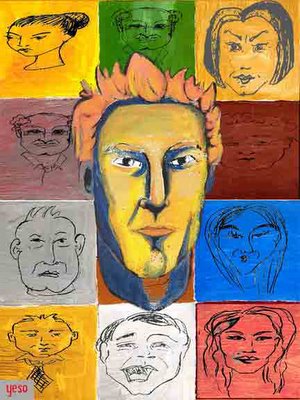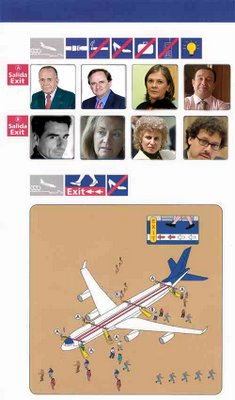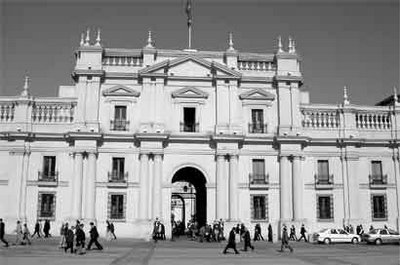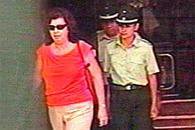
I find it interesting that for an entire week since Michelle Bachelet made public her choice of ministers for her new cabinet, the local newspapers have been successively brimming with the strange and repetitive conclusion that the Chilean president-elect represents a radical break with the ruling elites which make up her coalition ("the parties for democracy"). Everyone with access to a space in print media has rallied around this very simple, yet curious, conclusion: that Michelle Bachelet is some sort of a renegade politician determined to entirely re-organize the chambers of power. It's rather amazing. Wherever you turn, the same rhetoric is used over and over again. Bachelet is confirming her "unique style", her retreat from "politics as usual".
This presumed "radicalism" is anchored on the basis that she has somehow ignored the political parties, which make up her coalition, in the selection process. This, I must add, has led to an unfortunate explosion of editorials spouting the "unquestionable importance" of political parties in democracy as well as the president-elect herself ratifying the same. Other mechanisms employed to accentuate her "rebellion" include the nauseously repetitive affirmations that she has a "unique style", and that her latest decisions indicate a departure from the conventional. Of course, mixed in with these "indicators" of discontinuity with the political establishment is the related gender issue. After all, she is a woman.

As a woman, she will no-doubt incarnate a different "style", but whether or not this will translate into a real change in the policies of the concertacion is not something that should just be assumed, as the media is already starting to do. Let's try to remember that the fact that she's a woman, while historical and important for Chile and the world in the sense that the cultural fabric that usually leads to discrimination against women in the workplace has been significantly altered (and that's positive!), does not mean that the upcoming government will be more feminine, more autonomous, or more "sensitive" to the needs of women, families, or the poor. Unlike Evo Morales, who became president of Bolivia precisely because of who he is and where he came from (and the promise to bring his point of view of the country into the presidential palace), Michelle Bachelet is president (or will be) not because she's a woman. I might not have the authority to make the following statement, but common sense tells me that Michelle Bachelet rose up the ranks in the concertacion the same way every other politician does: going with the flow, behaving as expected, avoiding controversy, compromising personal values, learning how to talk to the media, etc. In other words, behaving like a man in a political environment dominated by men. Why should we automatically assume that once in power, she's going to act intelligently, with foresight, and with empathy, in other words, with what many consider to be a woman's touch? Maybe she'll be as heartless and reactionary as the warm and fuzzy Margeret Thatcher.
In a recent La Tercera article about the new cabinet, Michelle Bachelet is interpreted as having applied a sort of "shock therapy" to the concertacion. The last time they used this clinical term in politics was to describe what Pinochet did to Chile's economy in the seventies. In other words, heavy stuff. According to La Tercera, the ground where the concertacion stands has been shaken by a Bachelet-inspired earthquake of grand magnitude.
New Faces, New Ideas?
Chile is not exactly a big country, but what passes for a "new face" in Chile is quite alarming. "Nobody gets seconds!" and "new faces!" announced Bachelet during her campaign run. And, as La Tercera confirms in an article dedicated to creating the illusion of controversy around the cabinet appointments, it seems that keeping this simple promise of "new faces" is part and parcel of this supposed "bacheletazo". But if you look closer at the faces neatly stacked in the easy-to-read newspaper layout, you'll begin to get an uncomfortable feeling of familiarity.
Isn't that Andres Zaldivar's face hovering comfortably in the Minister of the Interior's slot? He's not exactly a "new face", is he? Zaldivar has been senator, minister of the treasury, assistant to the minister of the treasury, president of the Christian Democrat party, and he's been part of the political establishment since the 1950's! Hey, isn't that Alejandro Foxley's face in the Minister of International Relations' slot? Alejandro Foxley is not exactly the new kid on the block. He's been minister of the treasury, a senator, the president of the Christian Democrat party, and he's also been a quite familiar face in the political establishment of the concertacion through the long (and seemingly endless) years they've been in power.
Surely the new head of the economy is a "new face" with new ideas behind him. It has been said that Andres Velasco, now minister of the treasury, is a man made in Harvard, not in Chile, and undoubtedly Harvard is quite far from Santiago. Surely, nobody must have the faintest idea who he is when he visits the presidential palace as a tourist. After all, since he was fifteen, he's never been in Chile for more than 12 months at a time! But what exactly does he do in those 12 months? Well, it turns out that he too has been an integral part of the concertacion establishhment, working for the minister of the treasury, Foxley, back in 1990 and more recently negotiating the free trade agreement with the United States. As head of Corporacion Expansiva, a virtual liberal think-tank that conjures up neoliberal solutions for problems exacerbated by neoliberalism, Mr. Velasco has helped unify the concertacion liberals and transform them into a powerful force inside the political establishment. Another new face.
The youngest member of the cabinet, excluding the new minister of culture, is Ricardo Lagos Weber, now in charge of public relations. We'll be seeing a lot of his face. He's only 43! Thank Jesus we finally have a new face behind an important cabinet position. But wait, isn't Ricardo Lagos Weber the son of current president Ricardo Lagos? Wow, so even when we actually get a new face, it looks a lot like an old face!
Maybe there's confusion on the rhetorical level in the media. Maybe we need to figure out what we mean by "new face". Might a new face mean that the face in question hasn't been seen very often by the public? That certainly can't be the definition. Surely there are people who've been part of the political establishment for ages, faces as recognizable as President Lagos or even Eduardo Frei, working diligently behind the scenes, far from public scrutiny, and virtually unnoticed. These people surely shouldn't be considered new faces, no matter how new they feel to us.
But nevertheless, there is a unique urge in the media these days to present these initial decisions as "clear signs" of a radical departure on behalf of the president elect; a departure, a new awakening, a rebirth. It's attractive and refreshing, but it just might not reflect the reality on the ground. I don't want to sound pesimistic, but Michelle Bachelet's cabinet is far from representing a break with "politics as usual". Despite what the media keeps repeating over and over again, her future cabinet reflects a desire to continue with the same fundamental economic and social policies that have governed the concertacion for a long time.
 The project: Chile's Tri-Colored History
The project: Chile's Tri-Colored History

















